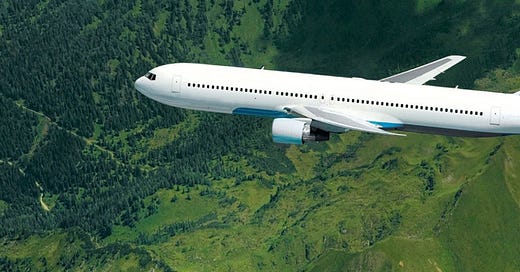Virgin Atlantic has stopped buying carbon credits from the Oddar Meanchey REDD project
On 9 January 2018, Virgin Atlantic told the Phnom Penh Post that it had stopped buying carbon credits from the Oddar Meanchey REDD project in Cambodia. Virgin Atlantic’s decision followed the publication of a report by Fern that highlights the problems of offsetting emissions from the aviation sector. One of the case studies in the report was Oddar Meanchey.
Virgin Atlantic offers its passengers the option of offsetting their flight emissions with carbon credits. Virgin Atlantic partnered with a UK-based company called Natural Capital Partners and one of the projects that the company bought carbon credits from was the Oddar Meanchey project in Cambodia.
Natural Capital Partners sells the carbon credits via its website at £10 each.
In 2016, the average price for voluntary carbon credits from REDD projects was about US$4.20 (or about £3.41 using a 31 December 2016 exchange rate), according to Ecosystem Marketplace’s State of the Voluntary Carbon Markets 2017.
Of course, Natural Capital Partners can charge whatever it likes for carbon credits.
But as Fern points out in its report, “the forest is being destroyed, not protected”.
Natural Capital Partners says Fern’s report is outdated
After Fern’s report was published, Virgin Atlantic asked Natural Capital Partners to investigate the claims made by Fern.
In response to Fern’s report, Rebecca Fay, chief marketing officer at Natural Capital Partners told the Phnom Penh Post that, “The Fern report appears to be based on articles from 2014 and 2016 which they have taken from other publications.”
Fay declined to answer the Phnom Penh Post’s questions about how Natural Capital Partners carried out its investigation, or how the company reached the conclusion that the issues had been solved.
Fern’s report was based in part on two posts on REDD-Monitor, dated 2016 and 2014:
The 2016 post was based on research carried out by Timothy Frewer, a PhD student at the University of Sydney. Frewer’s research, including almost 300 interviews with people living in the area of the Oddar Meanchey project showed a high level of dissatisfaction with the project, and a failure to protect the forests.
Frewer told REDD-Monitor that, “In many of the sites more than half of the forest (at the time of verification) has disappeared. The REDD programme has been powerless to stop these processes.” He added, “If we measure REDD in terms of providing people with a humble income stream that can act as a disincentive to clearing forest, then the project has failed miserably in all sites.”
The 2014 post was a series of photographs of the Oddar Meanchey project area taken in 2012 by Shalmali Guttal of Focus on the Global South. The photographs showed areas of forest cleared by the Cambodian military, a road built through a community forest area by the military, and construction of a military bunker inside a community forest.
The REDD project was incapable of stopping the military from destroying the forest.
Bogus credits
As Julia Christian, forest governance campaigner at Fern, explains to the Phnom Penh Post, it makes no sense to argue that the Fern report is “outdated”:
“The main thrust of our report/case study is that extensive deforestation has happened in the forest the project said it was going to save. This means the carbon credits the project has sold to other parties (including Virgin Airlines) are bogus – they are based on emissions savings that never happened, because the forest was destroyed not protected.”
In an email to REDD-Monitor, Christian writes,
“Protecting forests is clearly a good thing, and — as an organisation campaigning to protect the world’s forests — we strongly support all those working to do this. However, this experience shows exactly why finance for forest conservation projects shouldn’t come from people who are using it to justify increased emissions on their end — especially when the project isn’t even protecting the forest it said it would.”
The flawed logic of forest offsets
In a comment to the Phnom Penh Post, Anna Catchpole, a spokeswoman for Virgin Atlantic, highlights what’s wrong with carbon offsets. She said the Oddar Meanchey REDD project had been included in Virgin Atlantic’s portfolio “in good faith”. In 2013, Natural Capital Partners had confirmed that the project complied with international standards. Catchpole says,
“As a customer, we rely on independent accreditation schemes like this to ensure quality. But things can change in the years between verifications, and because of the subsequent concerns raised we asked NCP to remove this project from our portfolio.”
Fern’s Julia Christian points out that this statement reveals the flawed logic behind forest offsets. “Virgin’s claim that ‘things can change between verifications’ underlines precisely why offsets don’t work,” Christian writes.
“The airline may have stopped purchasing Oddar Meanchey credits, but for the offsets they have already used, the emissions they were meant to ‘balance out’ are now forever in the atmosphere.
This can happen at any point in a forest offset project, even years after the project is finished. As soon as any forest is destroyed, its effect of balancing out emissions disappears. Storage of carbon in forests is highly reversible and volatile. It cannot be used to balance out the release of carbon into the atmosphere — which is permanent.”
Full disclosure: REDD-Monitor has in the past received funding from FERN. Click here for all of REDD-Monitor’s funding sources.






